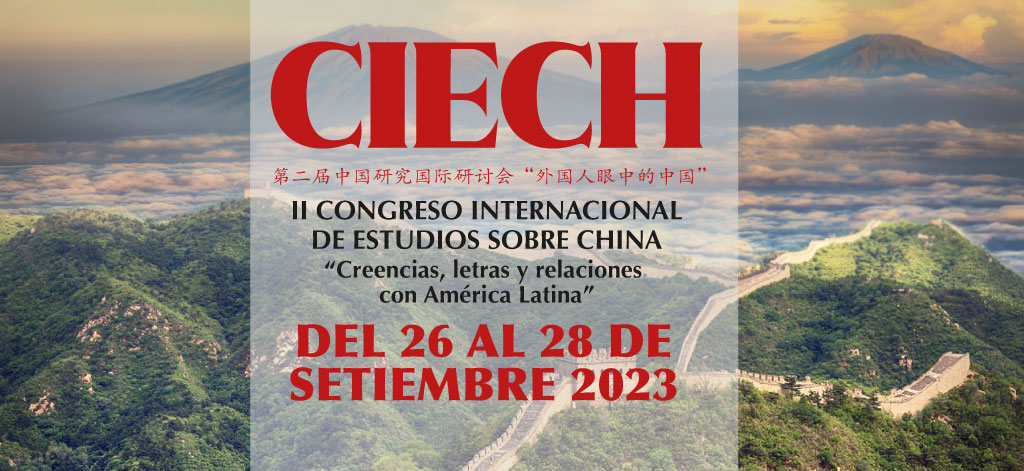- Home
- PUBLICATIONS
- II CIECH
II International Congress of China Studies (II CIECH)
For us at the Confucius Institute, the Pacific Headquarters, the Latin and (Hispanic) Americanist Academic Network on Sinological Studies and the International Journal on Asian Studies of the University of Costa Rica, it is a pleasure to attach the official program of the II Congress International Studies on China (II CIECH): “Religiosities and literature and contemporary China and Latin America relations.”
The II CIECH will be held from September 26 to 27 in the CIMAR auditorium in the UCR Research City and on September 28, 2023 at the Pacific UCR Headquarters in Cocal, Puntarenas.
The II CIECH will have two thematic axes
I. Axis – Religiosities and literature
- Religion (beliefs, power relations, social imaginaries)
- Literature (ancient, contemporary and literary translation)
II. Axis – Contemporary China and Latin America
- Chinese economy, its relations and trade agreements
- Chinese governance, its international relations and its role in global governance
- Public policies and global cooperation policies
The purposes of the II CIECH are to analyze Chinese beliefs and literature from different perspectives, as well as China's relations with Latin America, on the one hand, with the diverse cultural expressions of beliefs, religion and literature, while , on the other hand, from its contemporary political and economic project, its international relations and its role in global governance. Firstly, a greater understanding is sought of the deconstruction of beliefs and social imaginaries of a religious or esoteric nature of the local in their contact with what has come from abroad, the cases of Confucianism and Daoism, or the sinicization of Buddhism, Islam or Christianity. Secondly, it seeks to explain the roles of China and its relationship with Latin America in the various commercial, political, sociocultural and economic processes, as well as their implications for inclusion and social equity. These problems will be addressed and enriched by the intellectual work of the researchers participating in the conferences, panels and thematic group activities.
The II CIECH is aimed at teachers of Chinese language and culture, workers in the export, commercial, political and diplomatic sectors, academics, students or the general public interested in issues related to China. In addition, it will have pre-II CIECH and post-II CIECH activities that will follow up on the different processes.
Renowned experts from Argentina, Brazil, Chile, China, Colombia, Costa Rica, Cuba, Spain, the United States, France, Italy, Mexico and Peru will participate in the II CIECH.
Inscription
Registration start date: April 1, 2023.
Extended registration deadline: August 31, 2023.
Registration cost: 6000 colones, includes certificate of participation.
Students: free.
Payment method
- Bank deposit, in the National Bank account number: 100-01-000-140077-9, with the detail: Project 2444-01, your name and surname; You can then send the receipt to our email secretaria.confucio@ucr.ac.cr
- Transfer to the client account in colones 15100010011400776, IBAN account CR88015100010011400776, legal ID 3-006-101757, Fundación UCR, indicate in the detail: Project 2444-01, your name and surname; You can then send the receipt to our email secretaria.confucio@ucr.ac.cr
Free registration link: https://forms.gle/cxrnt8srXqdwxttq5
Registration link that includes certificate (6,000 colones): bit.ly/3LEAL4B
Publication of the final program: August 30, 2023.
Any questions or queries to tel.: 2511 – 6870 and email: institute.confucio@ucr.ac.cr or secretaria.confucio@ucr.ac.cr
National and international speakers:
I. Axis – Religiosities and literature
- Dr. Baofeng Xu, Professor, Beijing Language and Culture University, Director of Silk Road Research Institute and Center of Sinology, China.
Topic: Ancient literature
- Teacher Liljana Arsovka, professor at the Center for Asian and African Studies, El Colegio de México.
Topic: Literature
- Dr. Joseph T. H. Lee, Director of the Global Asia Institute, Pace University, New York.
Topic: Chinese religions (Protestantism)
- Dr. María Elvira Ríos Peñafiel, professor at the Pontifical Catholic University of Chile, Santiago de Chile.
Topic: Chinese religions (ecological Buddhism)
- Dr. Mario De Grandis, Professor at the Irish Institute of Chinese Studies at University College Dublin, Republic of Ireland.
Topic: Chinese religions (Islam and Hui minority)
- Dr. Roberto Carlos Pavón Carreón, Graduate in pedagogy, translator, interpreter and teacher of Chinese, Arabic, Russian, English, Sanskrit, Hebrew, Italian and Portuguese. Mexico.
Topic: Literature
- Dr. Chen Yong, professor at the Center for Asian and African Studies, El Colegio de México.
Topic: Chinese religions (Confucianism)
- Dr. Lai Sai Acón Chan, coordinator of the interdisciplinary research team in the Project for the Recovery of the Historical Memory of Chinese Migrations to Costa Rica and the Latin (and Hispanic) Americanist Academic Network on Sinological Studies, University of Costa Rica.
Topic: Chinese religions (Catholicism and immigration)
- Dr. Filippo Costantini, coordinator of the International Korean and East Asian Studies Program PIECEA and director of the International Journal on Asian Studies, University of Costa Rica.
Topic: Chinese religions (Daoism)
- Mr. Otto Apuy, artist and writer, Costa Rica.
Topic: Literature
- Dr. Ricardo Martínez Esquivel, coordinator of the Latin Americanist (and Hispanic) Academic Network on Sinological Studies and the Latin American Observatory on Asia and Africa, University of Costa Rica.
Topic: Chinese religions (Catholicism)
- Dr. José Salazar, Ecuador
Topic: Chinese religions (Confucianism)
II. Axis – Contemporary China and Latin America
- Dr. Evan Berman, Senior Lecturer, São Paulo School of Business Administration, Getulio Vargas Foundation, Brazil, and Adjunct Professor, Fudan Institute on Global Public Policy, Fudan University, Shanghai, China.
Theme: Contemporary China
- Dr. Jinlong Liu, director, China-Brazil Universities Cooperation Center, Renmin University of China.
Theme: Contemporary China
- MBA. José Carlos Feliciano, deputy director of the Center for Studies on China and Asia-Pacific, Universidad del Pacífico, Peru.
Theme: Contemporary China
- Dr. Ignacio Villagrán, director of the Argentina-China Studies Center, University of Buenos Aires, Argentina.
Theme: Contemporary China
- Dr. Raúl Ramírez Ruiz, academic director of Transparency and Good Governance of the Vice-Rector's Office for Quality, Ethics and Good Governance, Rey Juan Carlos University, Madrid, Spain.
Theme: Contemporary China
- Dr. Kevin Chen, Associate Professor, New York University
Theme: Contemporary China
- Mr. Gaosheng Dai, Representative of CCPIT (China Council for promotion of international trade)
Theme: Contemporary China
- Magistrate Patricia Rodríguez, former ambassador of Costa Rica to the People's Republic of China, and retired professor from the School of Political Sciences, University of Costa Rica.
Theme: Contemporary China
- Dr. Velia Govaere, Former Vice Minister of Economy, Industry and Commerce (MEIC) of Costa Rica, international director of the State Distance University, Costa Rica.
Theme: Contemporary China
- Dr. Elma Bejarano Lichi, advisor to the Vice Minister of the Interior and Police on international cooperation and migration issues. She is a professor of International Relations at UACA and ICAP, Costa Rica.
Theme: Contemporary China
- Dr. David Ibarra Arana, professor of the Cultural History Section, School of General Studies, University of Costa Rica.
Theme: Contemporary China
- Ph.D. Jessica Vargas, professor at the School of Public Administration of the University of Costa Rica, exconsul of Costa Rica in Shanghai.
Theme: Chi
PROGRAMA
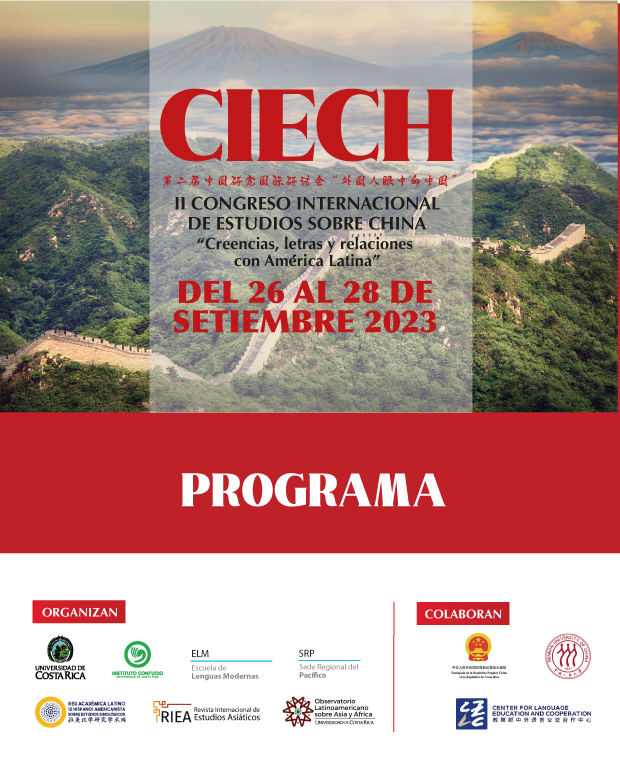
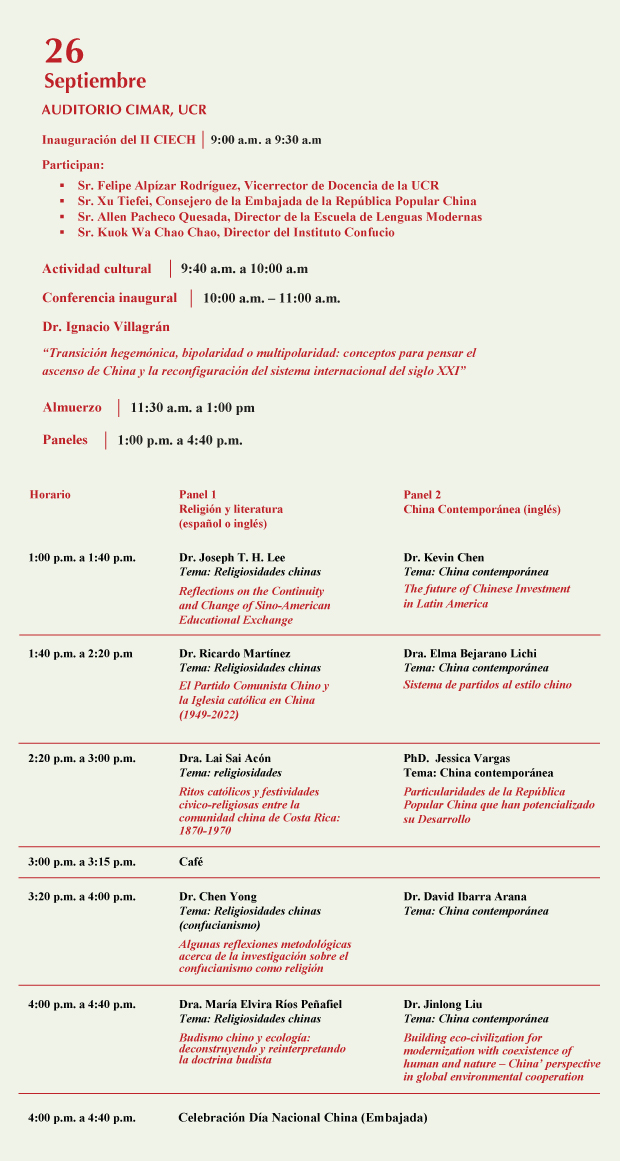
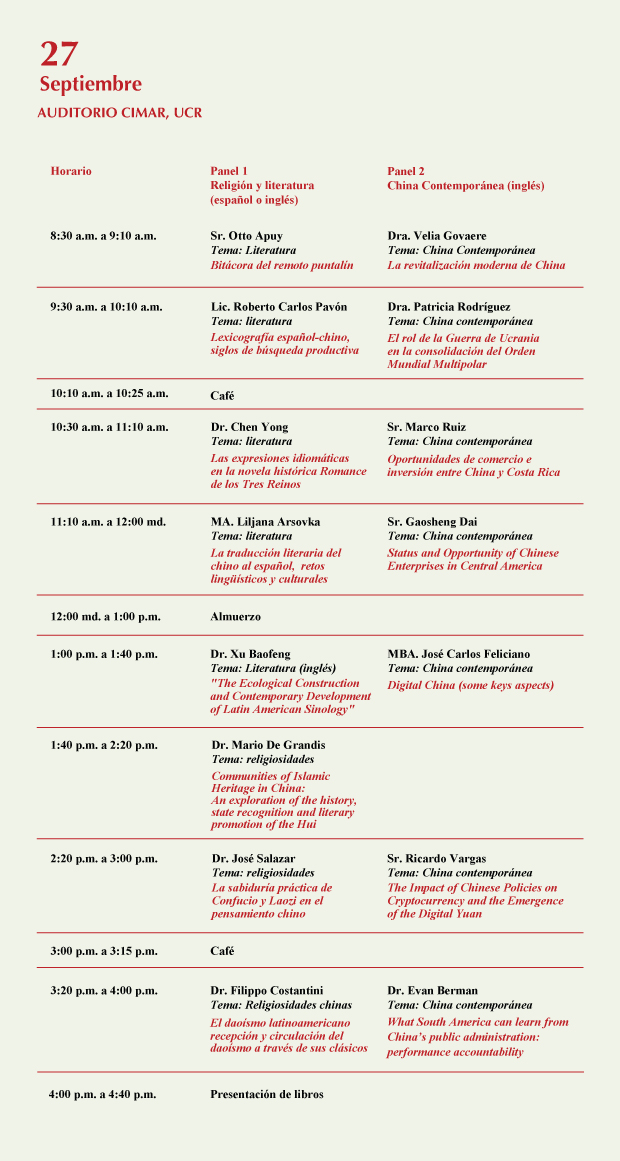
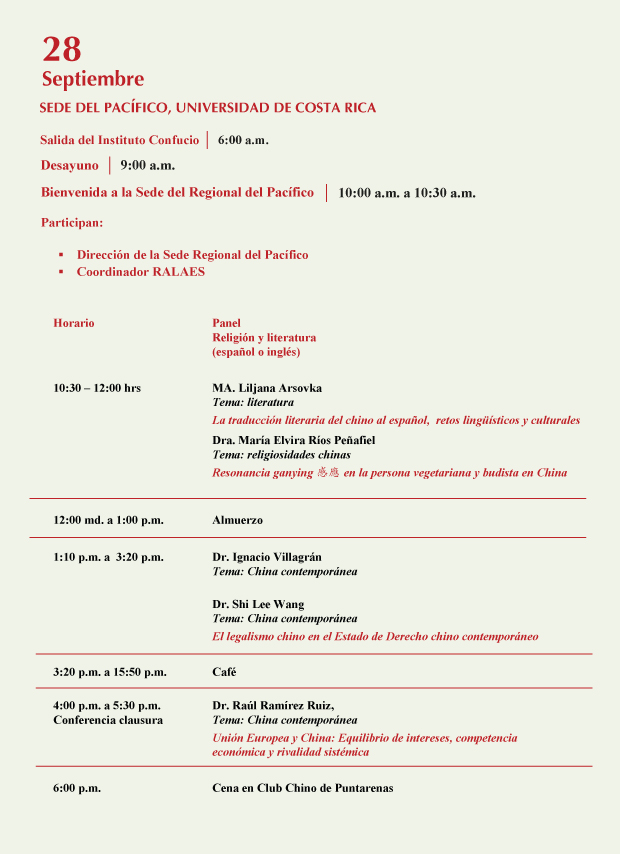
INSCRIPCIONES ACTIVIDADES:
PRE-CONGRESO: https://bit.ly/46iiC3J
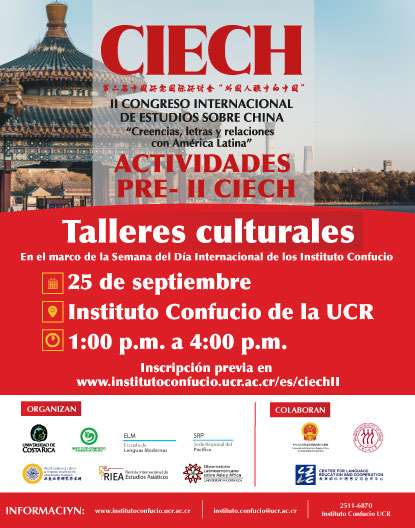
POST-CONGRESO: https://bit.ly/3LxvB9T
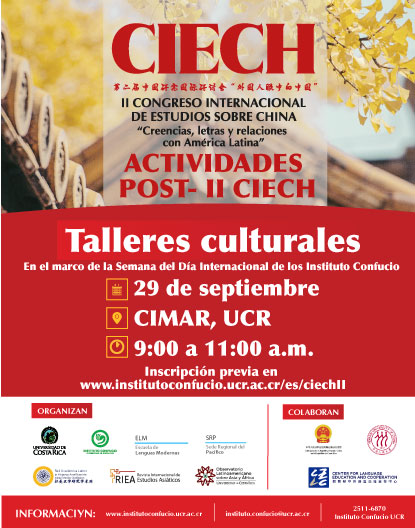
| Attach | Kind |
|---|---|


